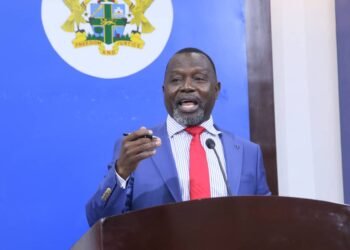In a very detailed analysis, Reginald Sekyi-Brown, a researcher and activist, has called for a comprehensive digital overhaul of Ghana’s Parliamentary website, describing it as a significant weak point in the country’s democratic architecture.
Drawing comparisons with the legislative portals of the United States and the United Kingdom, Sekyi-Brown’s findings highlight deep structural deficiencies in how Ghana’s Parliament interfaces with its citizens in the digital age.
The research, conducted between February and June 2025, relied heavily on artificial intelligence tools to triangulate and assess public-facing legislative platforms across three democratic nations.
“Ghana’s absence of direct legislator contact information and constituency histories, contrasted with the accessible frameworks of the UK and US systems, signifies not merely technical gaps but fundamental weaknesses in democratic responsiveness.
“These digital platforms thus function as revealing indicators of how effectively governance structures facilitate public voice, historical context, and ongoing civic dialogue.”
Sekyi-Brown Reginald
According to Sekyi-Brown, parliamentary websites are not just information hubs but practical embodiments of democratic values.

In the ten-point comparative analysis, Sekyi-Brown examined constituent-representative communication channels, legislative transparency mechanisms, historical constituency contexts, public engagement tools, and civic education resources. On all these fronts, Ghana lagged significantly behind the US and UK.
Perhaps most glaring is the issue of constituent access. The US Senate and UK House of Commons portals provide extensive contact details, including email forms, phone numbers, social media handles, and even postcodes for precise representative lookup.
In stark contrast, Ghana’s website offers no individual MP contact information beyond generic institutional addresses.
“This creates a democratic deficit, undermining accountability and the right of every Ghanaian to reach out to their representative regardless of their educational background.”
Sekyi-Brown Reginald
Elusive Transparency
Legislative transparency also remains elusive in Ghana. The UK Parliament, with its robust Research Briefings and real-time bill tracking under the “Open Parliament” commitment, and the US system through platforms like GovTrack.us, present clear, navigable, and data-rich legislative trails.
Ghana, on the other hand, merely lists bills with minimal context and lacks any form of plain-language summaries, impact assessments, or committee deliberations. This, Sekyi-Brown argued, widens the gulf between government processes and public understanding.
Another significant shortcoming lies in the historical and constituency contexts provided. The UK and US portals root their representation in history and place. Constituency dashboards integrate demographic data, electoral trends, and developmental histories.

In contrast, Ghana’s site merely lists MPs without explaining their constituencies’ foundational stories, development challenges, or the legacies of previous representatives.
Sekyi-Brown also examined digital participatory tools, citing Brazil’s “e-Democracia” platform as a gold standard. The Brazilian tool allows citizens to comment on bills and participate in virtual public hearings—opportunities neither Ghana nor even the US fully provide.
The UK makes limited efforts through petitions and committee evidence submissions. Ghana, however, offers no such digital means for citizens to engage substantively with the legislative process.
In terms of civic literacy, Ghana once again trails its peers. The UK’s House of Commons Library publishes explainers, historical analyses, and visual data for a broad audience.
The US Senate website is similarly resourceful with historical documents and procedural glossaries. Ghana, in contrast, provides little more than procedural basics without educational materials explaining its unique hybrid system or the roles of committees.
Key Recommendations
Based on this wide-ranging analysis, Sekyi-Brown issued five key recommendations aimed at making Ghana’s Parliamentary website a functional hub for democratic engagement.
Firstly, he advocated for an MP Contact Portal, arguing that the parliament website must include standardised MP profiles with direct contact forms, phone numbers, and social media links.
Also, he argued that constituency offices should be accessible to citizens digitally and physically, with mechanisms to acknowledge all inputs received.
Secondly, for Sekyi-Brown, each constituency should have a multimedia-rich page detailing its history, development priorities, and MPs’ legacy projects, grounding representation in place-based identity.
In calling for participatory mechanisms, he charged Ghana to adopt an interactive features modelled on Brazil’s “e-Democracia,” allowing the public to comment on bills and attend virtual hearings.
On improving civic education, Sekyi-Brown called for collaboration with the NCCE, urging parliament to publish explainers and research summaries tailored to various educational levels, drawing inspiration from the UK’s Parliamentary Office of Science and Technology (POST).
Lastly, Sekyi-Brown advocated for an accountability dashboard, urging Ghana’s Parliament to publish committee votes, MP attendance records, and performance impact assessments, borrowing from GovTrack’s approach in the US.

Reacting to the findings, Dennis Asare, Senior Policy Associate at IMANI Centre for Policy and Education, lauded the analysis and called for drastic reforms.
“With all these gaps, I wonder how Ghana appears to lead the Open Parliament rankings. The parliamentary website doesn’t even have all the bills and acts passed by the institution. If you want Public Accounts Committee reports for the last five to ten years, you can’t get them.”
Dennis Asare, Senior Policy Associate at IMANI Centre for Policy and Education
He added, “I’d rather check BRR or Dennis Law for recent Acts and Bills than visit Parliament’s official site. That says a lot about institutional priorities and digital neglect.”
Without immediate action to bring Ghana’s Parliament’s public interface into line with the values of openness, accessibility, and participatory democracy, the country runs the risk of lagging behind as the world enters a new era of digital governance. The time of Sekyi-Brown’s call to action is perfect.
READ ALSO: Government, COMAC Agree on June 16 Start for GH¢1 Fuel Levy























